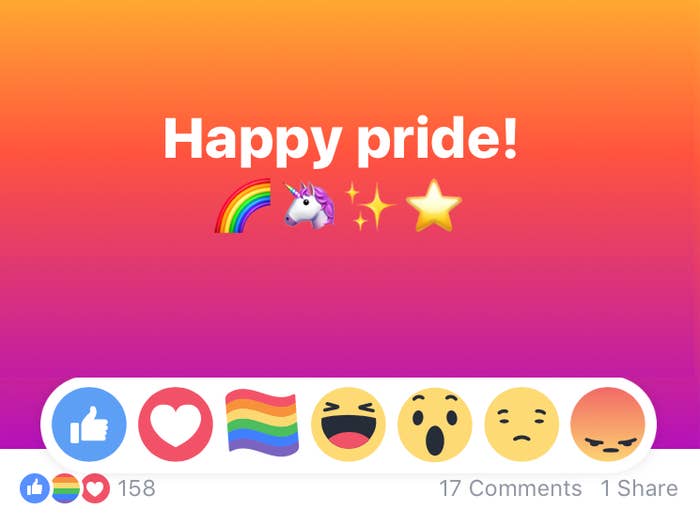
Facebook is limiting the availability of its rainbow reaction, which is meant to celebrate Pride Month, and is offering very little detail as to why. The reaction is currently unavailable in a number of locations, including countries with repressive LGBT policies such as Russia.
The rainbow reactions went live this month as part of Facebook’s pride celebration, and appear next to Facebook’s traditional “like,” “haha,” and “wow” reactions. But Facebook says it isn’t rolling them out everywhere because it is “testing” them.
Facebook’s approach to its pride-reaction rollout is drawing criticism from some who think it’s playing into the hands of repressive governments. “This is shameful,” Jillian C. York, director for international freedom of expression at the Electronic Frontier Foundation, wrote on Twitter. “Facebook isn't even ‘kowtowing’ to anti-gay states, they're doing their job for them."
In a post on June 5 announcing the new LGBT-themed reaction, Facebook said “We believe in building a platform that supports all communities. So we’re celebrating love and diversity this Pride by giving you a special reaction to use during Pride Month.” To access the reaction, Facebook asked users to like its LGBTQ@Facebook page.
“Because this is a new experience we’ve been testing, the rainbow reaction will not be available everywhere,” the company said in a blog post.
Although Facebook runs tests all the time, this situation appears different from the typical tech tests the company might use to determine, for example, whether people like its latest Snapchat-inspired feature. Rainbow reactions aren't a feature in and of themselves, and how they're used doesn't influence whether a product is viable or not.
A Facebook spokesperson declined to say whether the test in question was technological, or whether the reaction's limited rollout was designed to take into account repressive governments with anti-LGBT policies.
In this case, Facebook said in its post that the rainbow reactions would be made available to “people in major markets with Pride celebrations.” Other specially themed Facebook reactions, like a set of Halloween reactions that appeared last year, also had a limited rollout. But while Halloween simply isn’t a holiday observed everywhere, LGBT people exist all over the world.
In Russia, which has a law prohibiting "gay propaganda" and where pride parades often get shut down by attacks, people reported being able to see the rainbow reactions but not being able to use them. On its own Facebook page, the company responded to people in other countries inquiring about the rainbow reaction with varieties of this explanation: "This isn't yet available in some areas, but we hope to roll it out in more soon."
Presented with the criticism of its test's limitations, Facebook declined to comment beyond its initial post.
